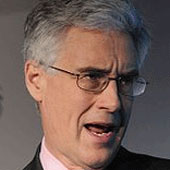The Need to Challenge Conventional Economic Wisdom: Part I
How has the global financial crisis forced policymakers to reconsider the established economic conventional wisdom?
August 1, 2011
A profound challenge to the conventional economic wisdom is essential. Because while there were undoubtedly many failures of economic theory and public policy specific to the financial system itself, those failures existed within and were nurtured by a wider dominant consensus. That conventional wisdom manifested itself in the political economy as much as in technical economics. Paradoxically, in the realm of political economy, one of the tenets of the conventional wisdom was to deny the feasibility or importance of political choice.
The conventional wisdom had three key tenets:
![]() First, that we know the key objective of economic policy, and indeed of public policy more generally, and that it is economic growth, rising prosperity, increasing GDP or GDP per capita. “It’s the economy, stupid. Vote for me, and the economy will grow more rapidly.”
First, that we know the key objective of economic policy, and indeed of public policy more generally, and that it is economic growth, rising prosperity, increasing GDP or GDP per capita. “It’s the economy, stupid. Vote for me, and the economy will grow more rapidly.”
![]() Secondly, that we know the means by which growth will be maximized, and that is essentially through market liberalization. Deregulation as the route to economic efficiency in all product and service markets. Free trade and free capital flows as crucial drivers of economic development and catch up. Financial market liberalization and increased financial intensity as the route to efficient dispersal of risk and efficient allocation of capital.
Secondly, that we know the means by which growth will be maximized, and that is essentially through market liberalization. Deregulation as the route to economic efficiency in all product and service markets. Free trade and free capital flows as crucial drivers of economic development and catch up. Financial market liberalization and increased financial intensity as the route to efficient dispersal of risk and efficient allocation of capital.
![]() And third, that inequality is justified because it creates incentives which make markets efficient, which in turn generates growth, and that inequality doesn’t matter much as long as prosperity is rising, with absolute income important to human well-being, while concerns about relative income a product of unattractive envy.
And third, that inequality is justified because it creates incentives which make markets efficient, which in turn generates growth, and that inequality doesn’t matter much as long as prosperity is rising, with absolute income important to human well-being, while concerns about relative income a product of unattractive envy.
These three propositions have formed an internally consistent and self-reinforcing belief system, a belief system which then can be and has been used to challenge the possibility of political choice — whether on the environment or on income distribution. “There is no alternative” is how Margaret Thatcher put it.
And I suspect if we polled non-economists, we would find that many believe these tenets derive directly from economics, indicating that the dismal science is all about showing us how constrained public choices are.
Instead, new economic thinking has to restore the recognition of economics as a tool for elucidating political choices. And to do that, it has to challenge assumptions about objectives as well as means — and question in particular all three of the dominant tenets of the last 30 years.
On objectives, the crucial question which we cannot just ignore, is how important economic growth, as measured by national income accounts, is to human welfare.
Of course, many economists would deny that economics has ever said that maximizing growth is the objective. But it is clear that many practical men and women in finance ministries and industry and commerce departments think that economics says that growth should be the objective.
The question we need to ask is this: Does economic growth deliver increased welfare, or well-being or self-perceived happiness — or whatever we think the objective is? We cannot avoid the issue, but need to understand that it is a deeply contested one.
The work of Richard Easterlin, Bruno Frey and Richard Layard has suggested a clear answer: that increasing prosperity, measured however imperfectly by standard GDP per capita measures, matters a lot to human happiness or well-being as you go from the per capita income of Africa today to that of the developed world of, say, the 1950s or 1960s — but that once you reach that level, further growth delivers no further benefit.
But those findings have in turn been challenged by researchers such as Justin Wolfers, who find some correlation between self-perceived well-being and increasing GDP at all income levels.
My own conclusion, having looked carefully at both arguments, is that once you have reached high levels of income, the relationship between further growth and further welfare enhancement is uncertain and complex. More growth is perhaps capable of producing increases in human welfare, but it is not certain to do so
And there are certainly many good theoretical reasons for doubting whether further economic growth will limitlessly make us more content:
![]() The straightforward process of satiation and declining marginal utility given a hierarchy of human needs. One winter coat keeps you warm. A second winter coat gives you a perhaps important, but certainly secondary, benefit of fashion and style.
The straightforward process of satiation and declining marginal utility given a hierarchy of human needs. One winter coat keeps you warm. A second winter coat gives you a perhaps important, but certainly secondary, benefit of fashion and style.
![]() The way in which increasing prosperity through congestion can degrade the very good we are all now better able to afford. The richer we all get, the more crowded are the beaches and the skiing pistes we spend our money traveling to.
The way in which increasing prosperity through congestion can degrade the very good we are all now better able to afford. The richer we all get, the more crowded are the beaches and the skiing pistes we spend our money traveling to.
![]() The increasing importance, once basic human needs are met, of competition for relative status, for instance via the consumption of premium branded goods and fashion items.
The increasing importance, once basic human needs are met, of competition for relative status, for instance via the consumption of premium branded goods and fashion items.
![]() And the increasing importance of limited supply positional goods — above all housing in the most pleasant locations — so that even individuals not concerned per se with relative status, have to win in a competition for relative income to achieve absolute utility goals.
And the increasing importance of limited supply positional goods — above all housing in the most pleasant locations — so that even individuals not concerned per se with relative status, have to win in a competition for relative income to achieve absolute utility goals.
All these factors — combined with the empirical evidence — suggest we cannot simply assume that increased measured GDP will deliver increased well-being — even if it might under some circumstances. Foresightful economists were warning 75 years ago to be careful about attaching too much importance to measures of GDP.
Lionel Robbins, writing in the mid-1930s when national accounting conventions were first being developed, argued strongly that measures of “social income,” as he labeled the aggregate figure, only had meaning and usefulness in relation to monetary policy and stabilization policies. He argued that they were adequate for dealing with such issues because they can deliver useful information about year-by-year variations. But in relation to the end objectives of economic activity, Robbins wrote, “the addition of prices or individual incomes to form social aggregates is an operation with very little meaning.” We all may have learned that in undergraduate economics, but it is too often ignored and forgotten nowadays.
But economics cannot ignore the issue of what the ultimate end-objectives are — because the answers have real implications for policy. The arena is an uncomfortable one for those who like clear mathematical models because it raises philosophical issues: Is happiness the overall objective? Is it the same as well-being? If people were happy under a dictatorship, would that be okay? And where does justice enter the picture? If 99.9% of people were ecstatically happy in the face of the persecution of a small minority, presumably that is not an acceptable result.
Thinking about end-objectives such as well-being requires the use of measurement techniques such as surveys of self-perceived contentment, which are clearly quite as imperfect and shot through with methodological difficulty as any GDP accounting.
For that reason, I am extremely doubtful that our aim should be to replace GDP with some new measure — gross national well-being — and declare that the new maximand. But the absence of the perfect alternative should not make us content with the measure we have got. Economics must elucidate questions about end-objectives — not assume what the objectives are in order to give us something to model.
This series of articles was adapted from the author’s presentation at the Institute for New Economic Thinking’s conference at Bretton Woods, New Hampshire, on April 8, 2011. Published with the consent of the author.
Takeaways
Economics cannot ignore the issue of what the ultimate end-objectives are — because the answers have real implications for policy.
Many economists would deny that economics has ever said that maximizing growth is the objective. But it is clear that many practical men and women think that economics says that growth should be the objective.
New economic thinking has to restore the recognition of economics as a tool for elucidating political choices. And to do that, it has to challenge the dominant tenets of the last 30 years.
Read previous

Dateline Argentina: Going Home
July 29, 2011
